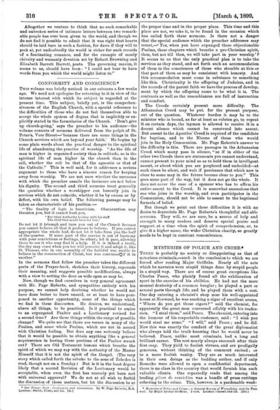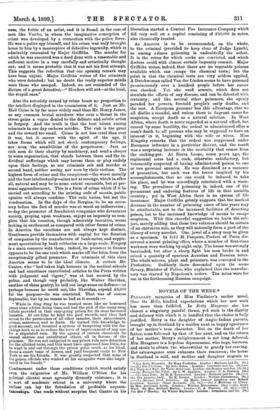MYSTERIES OF POLICE AND CRIME.*
THERE is probably no society so disappointing as that of notorious criminals,—such is the conclusion to which we are forced after reading Major Griffiths. Nearly all the acts which he narrates were stupid things done by stupid people in a stupid way. There are of course great exceptions like Charles Peace, who plainly found all the exhilaration of sport in the exercise of his abilities. He had not the mere manual dexterity of a common burglar ; he played a part or several parts through life, and he played them with a zest. One day entering a chemist's shop near his well-appointed house at Norwood, he was smoking a cigar of excellent aroma, "Where do you get those cigars?" said the chemist, for apparently the great man conversed affably with his trades- men. "I steal them," said Peace. The chemist, entering into the humour of his respectable customer, said : "I wish you would steal me some." "I will," said Peace ; and he did. Now this was exactly the conduct of the great diplomatist who always told the truth knowing that he would never be believed. Peace, unlike most criminals, had a long and brilliant career. The rest nearly always succumb after their first coup. They yield to foolish virtues, and are prodigally generous, without thinking of the comment excited ; or to a more foolish vanity. They are as much interested in their own doings as the budding author, and if only Romeike were allowed to open a. confidential department., there is no class in the country that would furnish him such valuable clients. One repeatedly reads that among the leading paces de conviction was a bundle of press cuttinum referring to the crime. This, however, is a pardonable weak- • Mysteries of Polies and Crints a General Survey of Wrongdoing and its Furs suit. By Major Arthur Griffiths. 2 vole. London Cassell and Co. [215.]
ness, the foible of an artist, and it is found in the case of men like Voirbo, in whom the imaginative conception of crime was developed by a connection with the police force. He was a police spy himself, and his crime was only brought home to him by a masterpiece of detective ingenuity, which is admirably recounted by Major Griffiths. The murder for which he was executed was a deed done with a reasonable and sufficient motive in a way carefully and artistically thought out; and it seems probable that it was not his first attempt. This suggests the reflection that our opening remark may have been unjust. Major Griffiths writes of the criminals who were detected ; but no doubt the really superior minds were those who escaped. Indeed, we are reminded of the dictum of a great detective,—" Murders will out—at the least, the stupid ones."
Also the notoriety earned by crime bears no proportion to the intellect displayed in the commission of it. Just as Mr. Hall Caine is by far more widely read than Mr. Henry James, so any common brutal murderer who cuts a throat in the street gains a vogue denied to the delicate and subtle artist in forgery. And the truth is that the best talent among criminals in our day eschews murder. The risk is too great and the reward too small. Crime is not less cruel than ever it was, but it moves with the spirit of the age, it takes forms which will not shock contemporary feelings, nor even the sensibilities of the perpetrator. Just as rich men do their charity by machinery, and send a cheque to Borne organisation, that stands between them and the in- dividual sufferings which may harass them or play unduly upon their feelings, so our criminals rob and murder at second hand, neither seeing nor seen by their victims. The highest form of crime and the completest—the worst morally and the best intellectually—aims not at revenge, which is, after all, natural and may be to some extent excusable, but at per- sonal aggrandisement. This is a form of crime which if it be carried out according to the existing code of morals, public opinion will always condone. The code varies, but not the condonation. In the days of the Borgias, to be an acces- sory before the fact of murder was at worst an indiscretion ; to-day the promoter of fraudulent companies who devastates society, preying upon weakness, enjoys an impunity so com- plete that his vocation, though admirably lucrative, seems lacking in excitement as compared with other forms of crime.
In America the vocations are not always kept distinct.
Gentlemen provide themselves with capital for the flotation of companies by the manufacture of bank-notes, and supple- ment speculation by bank robberies on a large scale. Forgery is a main resource with them, indeed, its presence in finance appears to be the one trait which marks off the felon from the exceptionally gifted promoter. For criminals of this class America seems to be the ideal climate. A certain Mr. Canter, who "had taken high honours in the medical schools and had sometimes contributed articles to the Press written with judgment and vigour," was at last secured by the police, and though very probably, like Walter Sheridan, another of these gentry, he laid out large sums on defence—or perhaps because he could not, like Sheridan, expend 24,000 for the purpose—he was convicted. That was of course deplorable, but by no means so bad as it sounds :—
" While in Sing Sing he was treated more like an honoured guest than a felon doing time, and had the pick of the many snug billets provided in that easy-going prison for its most favoured inmates. At one time he kept the gaol records, and thus had access to the particulars of all other inmates, their antecedents, crimes, sentences, and so forth. He turned this knowledge to good account, and invented a system of tampering with the dis- charge book so as to reduce the term of imprisonment of any one for a stipulated sum. By the agency of certain chemicals he erased entries and substituted others, all in favour of the prisoner. He was not subjected to any prison rule save detention for the allotted term, and this must have oppressed him little, for he went in and out through the prison gates much as he liked, drove a smart team of horses, and paid frequent visits to New York to see his friends. It was greatly suspected that some of the prison officials who winked at his escapades were also impli- cated in his frauds."
Confinement under these conditions (which would satisfy even the exigencies of Mr. William O'Brien for his political clients) must agreeably diversify existence; it is a sort of academic retreat in a university where the recluse can lay the foundation of profitable acquain- tanceship,. One reads without surprise that Canter on his liberation started a Central Fire Insurance Company which did very well on a capital consisting of 240,000 in notes, also chemically treated.
As America is to be recommended, on the whole, to the criminal (provided he keep clear of Judge Lynch), so among crimes poisoning is undoubtedly the safest. It is the crime for which cooks are convicted, and which doctors could with almost certain impunity commit. Major Griffiths states, indeed, that there are no vegetable poisons available which can escape the chemical tests ; but the point is that the chemical tests are very seldom applied. A Dutchwoman called Van der Linden seems to have poisoned promiscuously over a hundred people before her career was checked. Yet she used arsenic, which does not simulate the effects of any disease, and can be detected with certainty ; and like several other poisoners, she openly paraded her powers, foretold people's early deaths, and the rest. A European poisoner has this advantage, that we all dislike a scandal, and unless there is flagrant cause for suspicion, accept death as a natural solution. In West Africa, where death is never regarded as a natural effect, but caused by some hostility, the ordeal is administered after a man's death to all persons who may be supposed to have an interest in it, beginning with the wife or wives. Miss Kingsley remarks that the ordeal was suppressed under European influence in a particular district, and the result was a surprising increase in the mortality that comes from the cooking-pot. At Sierra Leone, some years ago, the regimental mess had a cook, otherwise satisfactory, but vehemently suspected of having administered poison to one or two personal enemies. He was dismissed as a measure of precaution, but such was the terror inspired by his accomplishments, that no one could be induced to take his place, and he was accordingly reinstated with a warn- ing. The prevalence of poisoning is, indeed, one of the permanent and enduring features of life in that amiable country ; yet in West Africa there is no system of life insurance. Major Griffiths grimly suggests that the marked decrease in the number of poisoning cases of late years may be attributable, not to the increased facilities of detecting poison, but to the increased knowledge of means to escape suspicion. With this cheerful suggestion we leave the sub- ject, merely adding that these two volumes should be certain of an enormous sale, as they will naturally form a part of the library of every novelist. One jewel of a story may be given as a specimen. In 1812 M. Pasquier, Prefect of Paris, dis- covered a secret printing office, where a number of first-class workmen were working by night only. The house was strongly barricaded, but after a sharp fight his men broke in and seized a quantity of spurious Austrian and Russian notes. The whole seizure, plant and prisoners, was conveyed to the Prefecture. Suddenly there descended upon the scene Savary, Minister of Police, who explained that the manufac- tory was started by Napoleon's orders. The notes were for use in the forthcoming Russian campaign.







































 Previous page
Previous page